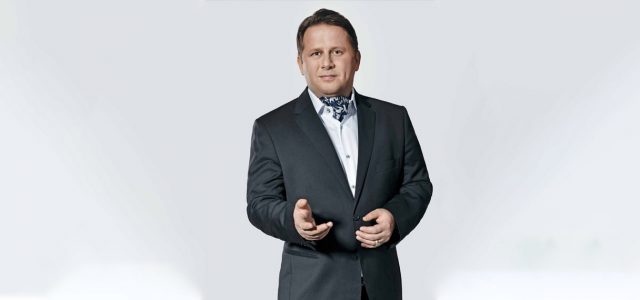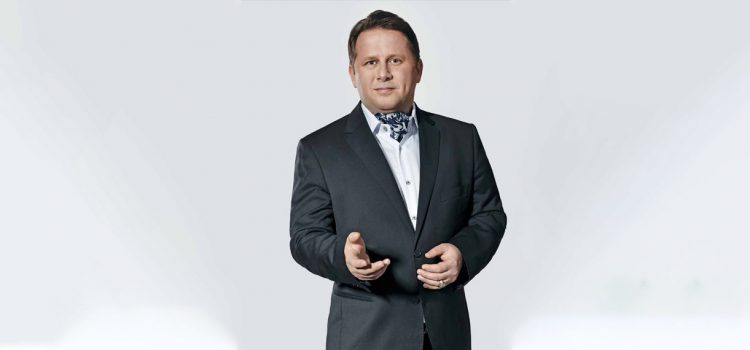

What we do to day, we do for generations to come – Rafał Wasik
Personality 14 December 2018 Krzysztof Sadecki 0

You live by the words “what we do today, we do for generations to come”; please tell us how this motto came to be?
Social trends led by non-government and international organisations influence the future of all societies on a global scale. Changes occur when it comes to the solutions undertaken in the process of creating an appropriate reality – first in the way we think, then in the way we live. This, in turn, creates a real future. Awareness of this is a responsibility which can be felt when making decisions. My work requires patience and perseverance when introducing numerous new solutions, because old or learned strategies are rarely useful when solving new problems. Every idea must bring good results in the future, so that future generations can look back and see them as something positive. When thinking of the future, decisions don’t come easily. The motto mentioned earlier came to me a long time ago; to be honest it came to me right at the first moment when I decided I wished to help others and donate my time to various social organisations: It simply helps me to bear the burden of my responsibility and make the right decisions.
IHRC is constantly involved with sectoral groups within the UN, could you please tell us what this all means and what these groups are?
The o ce of the International Human Rights Commission is very active when it comes to sectoral groups within the United Nations. Starting at the top: The United Nations High Commissioner for Refugees (UNHCR) is the sector responsible for securing shelters and providing non- consumable humanitarian aid. The next group would be the UNDP, or the sectoral group responsible for aiding in economic recovery and peaceful development. The third is UNICEF, or the division for protecting children. As you might assume, these groups, along with the IHRC have a lot of work in Ukraine, where there is an increasing number of people, including children touched by war in the Luhansk and Donetsk regions, are gaining attention and uniting Ukraine and the international community in the need to provide help. The human rights violations of the people of these regions and internal refugees, which continue to occur in the occupied region of Donetsk, and the risk of death within the war zone itself, are the primary issues which need to be addressed on various levels, including; the Ukrainian government, local authorities, international aid organisations and their partners. The International Human Rights Commission has currently dispatched a “Special Monitoring Mission” (SMM) to the regions of Luhansk and Donetsk, which observes and monitors for cases of human rights violations within the occupied territories. SMM also is involved in searching for missing persons within the war- torn regions, evacuating civilians from the areas of conflict, monitoring for areas where civilians may be imprisoned within the conflict regions, and providing general humanitarian aid. The goal of the SMM is the completion of operations geared reform; human rights education; fighting organized crime, terrorism, and human tra cking, monitoring and reforming military organizations, environmental protection, preserving sovereignty and territorial integrity, freedom of the press, free elections, good government, gender equality etc.
What does the IHRC have planned for the year 2017?
Taking up new challenges and further expansion, of course. Unfortunately, we could not register the IHRC in Poland. After numerous petitions, the KRS [National Court Register] refuted our request stating that the name of the organization could confuse people regarding its operation. Time will tell, it may turn out to be a good thing, but for the time being it’s hard to say, though I do not want to discuss politics… We will be working on a Polish division headquartered abroad.
The flow of information is very important to the global political situation. We know that the IHRC is also involved in fighting cybercrime. Has it been successful in this field? The organisation itself is not directly involved in fighting cyberterrorism, but works closely with organizations responsible for public security. Many of our ambassadors are international experts of AIAPS.
And what of the plans for transforming the IHRC into an International Federation of Human Rights Organisations? This is a very broad question which involves a lot of different issues. So not to dwell I will say, we are currently working on this and there is a great deal of negotiations ongoing with IHRC partners, but our lawyers are constantly analysing and implementing solutions for regulating such an organisation.
It is a challenge, because trying to unify so many various organisational structures and social movements into a formal- legal entity is a very multifaceted issue which requires the work of entire teams. The effects of all this will only become evident when the work is completed, but I am sure that time will come.
The challenges you must deal with every day require long term dedication to implementing solutions, how do you manage your time and decide on priorities?
I believe in the rule of: “What I can do two days from now I will do immediately”. I don’t put anything off, and my responsibilities do not allow me to let my guard down. What is very helpful is good planning, the ability to concentrate on and analyze problems, and the ability to synthesize proposals indicating new strategies and solutions. Of course, I don’t work alone – taking up these challenges requires having the support of a well-selected team of collaborators. In other words, having a realistic approach to the job and the right people are the priorities because without them it would be di cult to even think about it.
Do you find time to rest? Our readers would like to know how to get rested up so quickly.
I don’t think this is a secret (laughs). Practice allows us to develop a certain rhythm to our routines. Additionally, I would like to recommend that everyone stops using their smartphones and avoids using stimulants. As I mentioned in one of my earlier answers, every problem or challenge requires new solutions…A mind free of stimulants remains energetic for longer periods of time, as well as retains a freshness which is needed in the creative process.
The specifics of your job make you a kind of universal personality, like a good teacher – please forget humility for a moment and tell us about the people who worked with you and the IHRC and changed their lives.
You shouldn’t forget that when someone learns from you, you also learn from them… Over the past years, I have found myself in so many various situations that I don’t even want to think about them in the context of this question… I never act alone, but depend on the support of my teams, experts and friends. Working for the good of humanity both locally and globally, I feel very intimately and appreciate the effects of collaboration and sharing knowledge regarding completing various tasks. It is true that many people change their lives and perspective on humanity. Even if it’s only my personality and approach to the situation, then firstly both perspective and personality would have to be developed to such an extent as nothing happens on its own; it’s only natural that subsequent people will be receiving assistance. I don’t want to point anyone out, we all mutually transfer knowledge to one another in the shortest possible time regardless of external factors.
What is your take on protecting individual liberties in Poland and the rest of Europe based on the countries you have gotten to work in?
Let’s begin with the fact that the more freedom you give an individual, the more freedom they want. Europe is as diverse culturally as it is regarding individual levels of development, but thanks to its more developed members it is a wonderful place to work in regards to such an issue. The organisational problem of the continent is that just like with the circulation of energy in cells connected to one another, the energy does not always reach the areas where it is most needed. Too often it is simply accepted that some profit while others lose out. This situation will bring a great deal of work still in the future, but in regards to comparing Poland to other nations, I can say with certainty, things are good. The most important question, security…it is secured. Also, I would say the prices on the Polish market are very good and very lucrative in regards to the rest of the continent.
How do things look in Europe regarding human rights? What has changed since the migrant crisis?
Hybrid warfare swallows a great deal of innocent lives, but also has some long-term effects in the form of an increase in aggression, racism, and xenophobia, which cause many nations to close themselves off from the trials of other societies. Suddenly public opinion has been tainted by information which has never made it this far before in mass media, as freedom of speech has allowed internet based demagogues to publish contradictory and sometimes false or unverified news reports. Naturally thus many people got scared, lost faith in their politicians, and started fighting for their rights – primarily for their right to having a peaceful life.
The worst part of it is that now the people who really need the help are not receiving it. Instead of helping and providing education, Europe has become something unprecedented. The citizens of poorer countries who are looking at our European society see something like Elysium in the Neil Blomkamp film (2013) by the same title, where those living up in the habitat have no worries or sickness, while those living on earth are fighting for survival.
To finish, lets touch on the subject of informing citizens of their rights and legal education – is there a need for this in Poland?
We are living in an age dominated by the internet where information is inching toward totalism… The Internet, computers, tablets, smartphones, terminals, Wi-Fi…it’s everywhere. They are easily accessible and even the elderly have such gadgets, meanwhile having many television channels, radio, and print media at their fingertips. Since information is readily available, the needs for educating society are accommodated automatically. Nothing could be further from the truth. It is true that in the age of information ignorance is a choice, yet many people still don’t know what to look for and where to look for it. The law in Poland changes very quickly, and even though there are places that educate the public on the matter such as legal advice o ces in various government agencies, making the situation seem well balanced; the future may prove quite a different scenario. So, to answer your question regarding legal education for the public… That will be a very intriguing task. ■
Thank you for your time.





No comments so far.
Be first to leave comment below.